Events
Upcoming Events
Symposium held by the MQ Environmental Humanities Stream:
Engaging the Environmental Humanities: An MQ Environmental Humanities Symposium
This symposium highlights new research in the Environmental Humanities by researchers at Macquarie University and keynote speaker A/Prof Marilu Melo Zurita (UNSW). Presenters will discuss how they engage with the environmental humanities in fieldwork and conceptually. This symposium aims to bring together established researchers, ECRs, and HDRs in the context of recently formed ECR/HDR Environmental Humanities Group, with the aim of sharing some of the diverse ways of engaging with this dynamic field. The symposium also includes a discussion of the future of the Environmental Humanities Stream. The final session for the day is an ECR/HDR workshop on developing a publication strategy in the Environmental Humanities. Please contact the event organizers Emily O'Gorman, Donna Houston, and Fraser Gray for more information. RSVP by COB 22 March 2024.
Read about our past events below.
Past Events
Rundle Lecture: Dr Karin Sowada
Talk Title: The Queen's Jewels: Silver and the bracelets of Hetepheres I (c. 2600 BC)
Wednesday 28th Feb 2024, 5:30PM AEDT On campus and via ZOOM
CACHE is delighted to share an invitation to the first lecture for 2024 in the Rundle Lecture Series with CACHE members and friends. The lecture entitled The Queen's Jewels: Silver and the bracelets of Hetepheres I (c. 2600 BC) will be given by CACHE Executive Committee member, Dr Karin Sowada, Director of the Australian Centre for Egyptology / Rundle Foundation. The lecture will be held hybrid online and on-campus tomorrow night, Wednesday 28th February. For access to the Zoom link and location, please direct your questions to the Australian Centre for Egyptology / Rundle Foundation team.
CACHE National Archaeology Week Public Lecture: Dr Emlyn Dodd
Talk Title: The Falerii Novi Project: New excavations at an old Roman city
Friday 20th May, 6:30PM AEST via ZOOM
Host: Prof. Ronika Power - CACHE Director
CACHE was delighted to host its 2022 National Archaeology Week Lecture, featuring Dr Emlyn Dodd. Emlyn is a Greek and Roman archaeologist specialising in the study of ancient food and drink, agriculture, technology and trade. He is currently Assistant Director for Archaeology at the British School at Rome, and holds Research Affiliate positions with the Australian Archaeological Institute in Athens and the Centre for Ancient Cultural Heritage and Environment, is an Honorary Postdoctoral Fellow in the Department of History and Archaeology at Macquarie University, and an elected Fellow of the Royal Historical Society.
Abstract: Located 50km north of Rome, the ancient city of Falerii Novi lies buried beneath agricultural fields and olive groves with only monumental circuit walls still visible. Situated directly on the Roman Via Amerina, it has seen little modern occupation since antiquity. Archaeological survey using a variety of methods, including magnetometry and georadar, over the past 30 years has revealed a map of buried structures and created a comprehensive remote sensing dataset. New excavations have just begun.
The Falerii Novi Project, led jointly between the British School at Rome and universities of Harvard, Toronto and Ghent, is undertaking the first modern, scientific stratigraphic excavation of this Roman city. This research hopes to interrogate chronologies, urban development at a crucial point of Roman expansion, intercultural fusion, and themes of connectivity, migration, and daily commercial life. This talk will combine historical data, recent results from a preliminary season in 2021, and outline planned excavations in 2022 across three intramural zones.
Image: Emlyn Dodd (M. Amendolia)

Conference: Living Digital Heritage
5–7 November, 2021

Modern, innovative data collection and digital visualisation capabilities are able to capture ancient artefacts and structures, contexts and traditions faster and in greater detail than ever before. Their sophistication and multi-dimensionality promise engagement with the past at many levels offering opportunities for deeper analyses and experiences to increasingly broader audiences. This event will explore the applications of digital and virtual reality techniques for experiencing, preserving, and understanding ancient cultural heritage.
See the conference website for more information.
Conference: Egypt and the Mediterranean World from the Late Fourth through the Third Millennium BCE
20 May – 2 June, 2021 via Zoom

As one of the earliest state-forming societies whose reach can be seen across the Mediterranean world, Egypt’s interaction with its neighbours has been of great interest to scholars inside and outside of Egyptology for over a century. The objective of this conference is to bring together the latest research on the interaction between Egypt and the Levantine and Aegean worlds in the late fourth – third millennium (Late Early Bronze I – EB IV / Intermediate Bronze Age), by engaging scholars working directly in these regions. Each region is represented by a different institutional partner that will host a series of invited papers in an online format to allow for global participation.
More information can be found on the conference webpage.
Conference: Humans in Deserts - Stories of Exploitation and Survival
7–8 November, 2020 via Zoom

Human history is marked by the need to adapt to changing environments and circumstances. Environmental aridification has been a foremost concern for past cultures and remains a key issue for contemporary society. While physical survival and continued access to resources essential for life are obvious considerations, there are also cult, socio-cultural, and political reactions and adaptations to arid environments and the process of aridification which are to be taken into account. This event will consider how humans in ancient times were able to survive in, but at the same time exploit, deserts and arid environments.
More information can be found on the symposium webpage.
Workshop: Mentoring Kick-Starter
November 5th 2019, 1:30–4:30pm, Room 3.202, Level 3, Australian Hearing Hub
This event is for early-career, mid-career, and senior researchers to come together and explore opportunities for mentorship and research funding. The event will begin with a mentoring workshop led by Vicky Jones from Best Practice Consulting. This will be followed by an advice session from Jan Zwar and Jo Chipperfield from the Arts Research Office about available grant funding in Categories 1, 2, and 3, tailoring their information to our disciplines of history and archaeology.
All ECRs and HDRs close to completion, as well as mid-career and senior researchers, are encouraged to attend to find out what's out there for you!
Workshop: Drop-In Grant Writing Session
November 6th 2019, 10am–4pm, Conference Room A, Level 3, MUSE Building, 18 Wally's Walk
An all-day drop-in centre for writing grants in a friendly environment. Some of CACHE's mentors and researchers, including Prof. Majella Franzmann, will be on hand to discuss your research plans, offer practical advice, and share their experience of a successful grant-writing with you. The goal is to work out a plan for submitting a grant in 2020 or 2021.
Come with an idea for an individual or collaborative project, whether it is brand new or something you are resubmitting for funding. Proposals for projects that fall within CACHE's ambit of ancient cultural heritage and its reception and preservation, ancient peoples and their natural or built environments, or ancient models of leadership for the modern world are especially encouraged, but feel free to bring along anything else you are working on!
Workshop: Exploring the Past with Data
November 18th 2019, 9am–5pm, Museum of Ancient Cultures Seminar Room, Level 3, 29 Wally's Walk

Artwork by Katie Shead
Archaeology offers a unique insight into the long-term trajectories of cultures and populations, and can be used to trace the origins of many modern-day global technologies, staple food crops, cultures, beliefs and values. Like many fields of study, archaeology can be complicated, not least because the ever-growing mass of data becomes more and more difficult to deal with as it accumulates. Much research has become ultra-specialised, and a burgeoning number of publications are geared towards refining methods and incremental improvements to knowledge, rather than developing new models of the trends that link past, present and future.
Data scientists, historians, and archaeologists came together for a one-day workshop "Exploring the Past with Data", convened by CACHE Deputy Director Ronika Power and chaired by students in the Bachelor of Archaeology and Master of Research programs at Macquarie. The workshop explored new data-driven methods in archaeology and history that unravel patterns in the data and provide fresh insight into the powerful but sometimes hidden forces that shape society.
International and national speakers from industry, community, and university sectors came together to offer eight enlightening papers, a panel, and audience discussion. Researchers from Macquarie University, University of Melbourne, La Trobe University, and Queen’s University Belfast shared their expertise. Specialists in the industry and museum sectors as well as those working with communities in the Northern Territory also enriched the audience with their knowledge, including individuals from the British Museum, Science & Technology of Australia, EMM Consulting, and Ngukurr Community and Wuyagiba Study Hub.
Egyptology Symposium: Applying New Methodologies and Rediscovering Old Sources
August 30th 2019, 9am–1pm, Level 1 Theatre, Australian Hearing Hub

Seminar: The Mount Carmel Caves as a World Heritage Site
July 22nd 2019, 12:30pm, Mezzanine, Level 1,12 Wally's Walk

